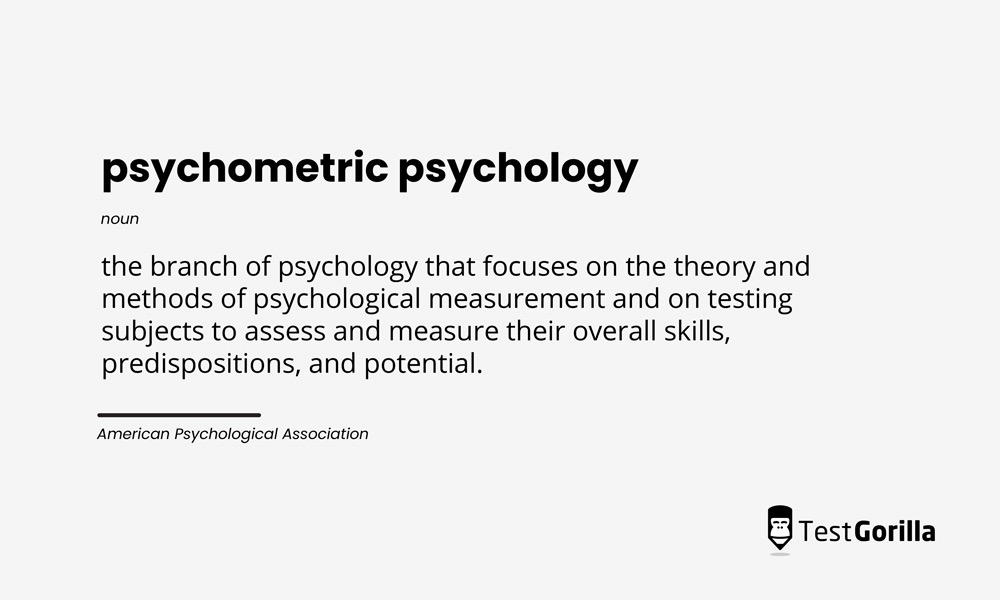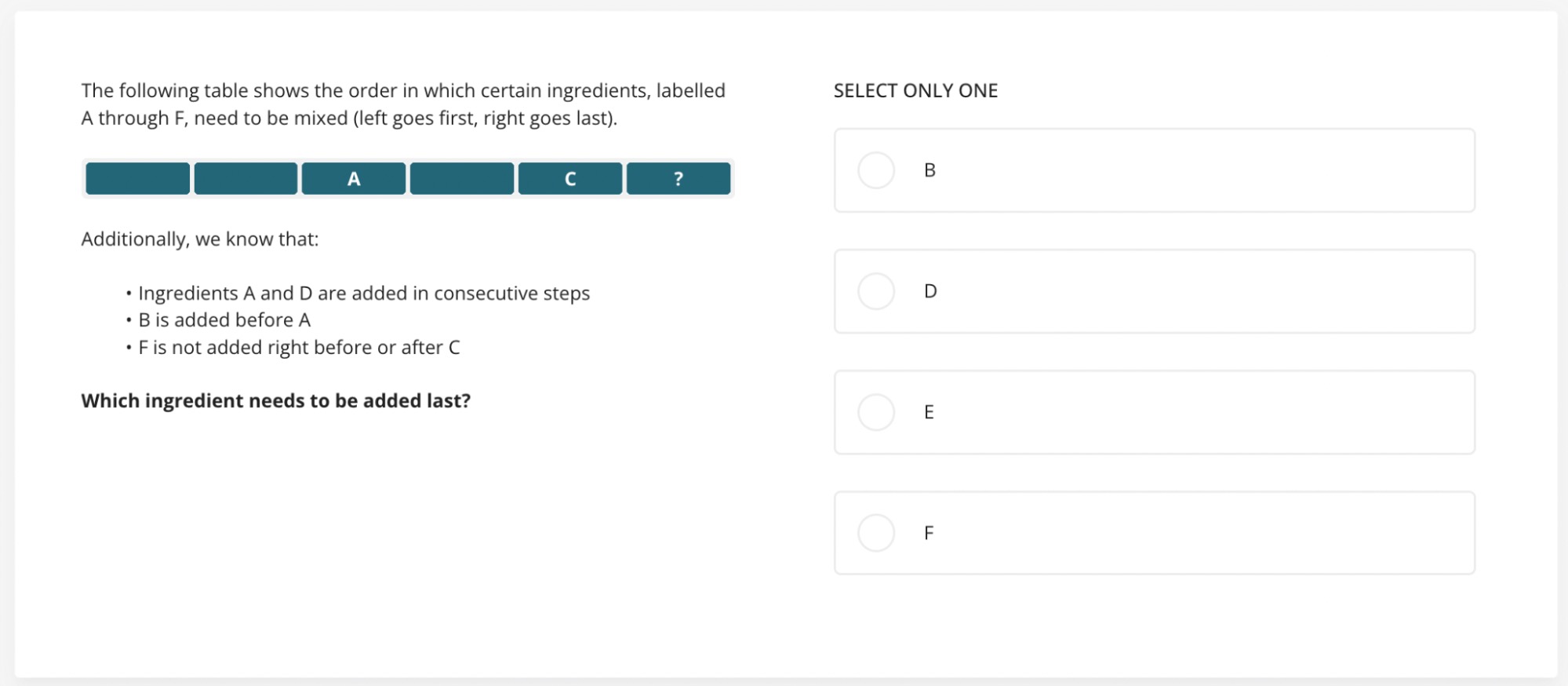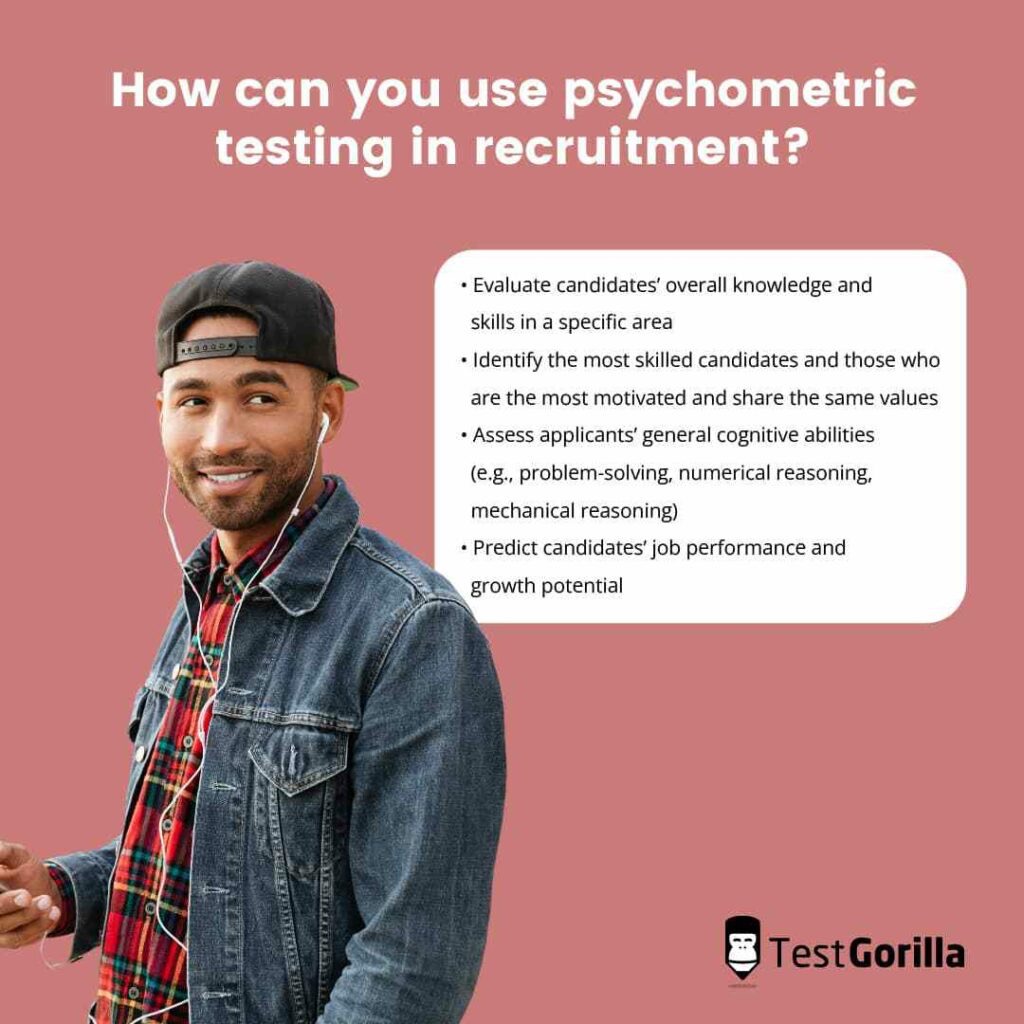Today, making accurate predictions about job candidates’ potential success is the cornerstone of an HR professional’s work – but such predictions are difficult to make.
Psychometric psychology is a field of study that can help you quantify the knowledge, abilities, personality characteristics, and attitudes of job applicants.
In this article, we explain psychometric psychology and how you can use psychometric assessments to strengthen and simplify your hiring process. We also look at what psychometrics can help you measure – from culture add potential to motivation, critical thinking, attention to detail, cognitive ability, and other “hidden” traits.
But first, let’s clear up some questions on the topic.
Table of contents
- What is psychometric psychology?
- What are psychometric assessments?
- What do psychometric assessments measure?
- What are the different psychometric assessment methods out there?
- How can you use a psychometric assessment for recruitment?
- Make better hires with the help of psychometric psychology
- Psychometric psychology FAQs
What is psychometric psychology?
Psychometric psychology, or simply psychometrics, is the branch of psychology that focuses on the theory and methods of psychological measurement and on testing subjects to assess and measure their overall skills, predispositions, and potential. It has a long history, starting with Sir Francis Galton and James Cattell and their work in the late 1800s and early 1900s.
So, using this psychometric psychology definition, how can we apply it to modern 21st-century recruitment?
Psychometry applies to the larger field of organizational psychology, the social science focusing on human behavior in the workplace. This methodology for obtaining quantitative measurements of psychological attributes is crucial for building a healthy and productive workplace community.
Psychometric theory can be used to measure many traits important for determining a good employee, including:
Knowledge and intelligence
Cognitive abilities and skills
Personality traits
Behavior and attitude
However, psychometric measurements don’t come out of thin air. Next, let’s talk about the psychometric approaches used for measuring the individual differences of these traits within test subjects.
What are psychometric assessments?
Psychometric assessments are a standardized method to measure mental abilities, personality, and behavior. Essentially, they’re psychological tests. They can measure a candidate’s suitability for a job based on the aptitude, skills, and personality traits it requires. For example, a personality test can assess how a candidate’s personality matches the work style, company values, and job expectations for a particular position.
A role-playing exercise, which can be part of a psychometric assessment, can show the candidate’s real-life response to a common work scenario for their job.
There are quite a few activities involved in executing and evaluating assessments, such as:
Designing reliable and valid tests
Administering assessments in a consistent manner
Measuring and handling data
Combining and comparing datasets
Visualizing information
Comparing candidates and their scores
When done properly, assessments are objective and free of bias, which ensures that hiring managers pick the qualified candidate for each role. Let’s look at the criteria for objective assessments below.
4 criteria for fair, accurate psychometric psychology assessments
Psychometric psychology depends on objective results to be effective. According to the guidelines of the leading psychometrics journal Psychometrika, psychometric assessments must meet four criteria to ensure fair and accurate results.
1. Standardization
Psychometric psychology and assessments must design their tests based on a population that is representative of the candidates taking the test to get accurate and objective results.
In addition, you must administer these assessments the same way to all candidates. The results of standardized tests need to be easily compared across candidates. Otherwise, the scores are meaningless.
2. Reliability
Psychometric assessment results must have internal consistency and be free from outside influences and errors. This means that the results shouldn’t vary wildly if a subject were to take the test more than once. For example, a test should be designed so that the test-taker’s mood shouldn’t affect the results.
Measuring the difference in results by giving a subject the same test at different periods is a statistical method known as the “Pearson correlation coefficient” or “test-retest reliability,” a key concept in classical test theory.
3. Validity
Validity is one of the key psychometric properties of an assessment, showing whether it measures what it is supposed to measure. For example, if an assessment is supposed to measure cognitive power, it shouldn’t test the subject’s knowledge on a topic because outside knowledge is irrelevant to cognitive intelligence.
4. Freedom from bias
Bias happens when test scores vary based on membership in a particular group. A biased assessment results in adverse effects on one group or more by comparison to others.
For example, the Binet-Simon test, one of the first IQ tests, is widely considered biased for focusing on facets of intelligence that are valued more in some cultures than others, so people from other cultures may not be conditioned into thinking in ways the test values.
Psychometric tests should be free from bias and discrimination and remain objective to be useful for their case uses, including recruitment.
What do psychometric assessments measure?
We use psychometric assessments to measure a wide range of topics important to any job, including personality, attitude, intelligence, and aptitudes.
Getting these right is essential in preventing costly mis-hires that can cause lost productivity and revenue, increased stress, and a loss of motivation and job satisfaction.
Let’s look at the most important traits and aptitudes these tests can measure.
Personality traits
Personality assessments give you insights into the candidates’ personalities and behaviors, letting you pick the candidate with the best personality for each role.
It’s not uncommon for these tests to be used in recruitment. One in five Fortune 1000 firms have been known to use tests to measure applicants’ personalities in the hiring process.
Remember, of course, that you shouldn’t use personality tests alone to make a hiring decision. Instead, you can then use this information on the applicants’ attitudes and behavior to supplement the rest of the data you have collected during recruitment.
You can choose from our many accredited personality and culture tests, such as our Big 5 (OCEAN) test, DISC test, or 16 Types test. You can find all of these tests in our Test Library.
A sample question from our Big 5 (OCEAN) test – click here to see more.
Most companies don’t know how to measure applicants’ motivation consistently, which is why we’ve created a test for measuring motivation. In it, the hiring manager and test-taker answer a series of questions to determine whether the candidate is a good addition and how their expectations align with the job offer.
Cognitive ability
Cognitive skills are essential for success in any job role. They refer to a person’s mental abilities, like problem-solving, reasoning, memory, and attention.
Cognitive assessments are intelligence tests that measure candidates’ ability to reason and think. Although some assessments can cover multiple topics and abilities at once, to achieve proper factor analysis, you need to have a focused assessment for each main facet of cognitive capacity.
You can use one of the many cognitive ability tests in our test library to assess critical thinking or problem-solving.
You can also use them for cognitive skills like numerical reasoning.
When you assess cognitive skills, you don’t evaluate job-related knowledge. Instead, you’re looking for inherent aptitude, which means that a candidate would perform well in a role.
Cognitive measurements should be obtained without consideration of any outside credentials of the subject, such as certifications or academic achievements. For example, an argument could be made that a candidate who scores higher on a numerical reasoning test would be a better selection than a low-scoring candidate with a degree in mathematics.
Soft skills: Motivation, cultural alignment, and ethics
Similarly to cognitive ability, soft skills cannot be taught. Instead, they are hard-wired in each person from an early age.
Soft skills are facets of a person’s personality, but because they can be manifested in different ways from completely different personality types, they can’t be deduced solely from personality assessments and must instead be measured independently.
The skills can include things like leadership, culture-add potential, and business ethics.
You may have noticed that we haven’t mentioned any technical, job-specific skills here. That’s because, as knowledge-based topics, technical skills aren’t in the psychometric domain of psychology.
Instead, they can be tested under the larger category of “pre-employment assessments.”
For the best results, however, we strongly advise you to use a multi-measure approach, where you mix different types of tests to thoroughly assess applicants’ cognitive abilities and personality traits in addition to their job-related skills.
What are the different psychometric assessment methods out there?
Questionnaires aren’t the only type of psychometric assessment you can use for psychometric testing.
There are three other categories:
Observation
Personality inventories
Projective techniques
Let’s look at each one in more detail.
Observation
Observation simply means watching and noting what an individual does in a controlled setting or the person’s natural environment.
Due to the nature of the recruitment process, HR staff are only able to observe individuals in controlled environments, such as at the office or via an online video call. It’s not until a hire is settled into their office that they can be observed in a “natural” environment for them.
Controlled observation involves giving a participant a task and noting their behaviors while they complete that task.
You can also use participant observation. In this method, the observer interacts with the participant directly in a larger group, though their nature as an observer may be kept secret. This way, the observer may be able to better control the circumstances they wish to see the participant react to. For example, the observer may act in a boisterous manner to test how the participant acts in difficult social situations.
Personality inventories
Personality inventories are different from personality assessments. They are self-assessment tools administered by hiring managers and recruiters.
They can uncover insights into a person’s social traits, attitudes, motivations, and strengths by asking an inventory-taker to explain how they might react to a real-life situation, like being reprimanded at work. However, they are less likely to yield the same objective results as skills tests because similarity bias can influence them.
Moreover, when people self-assess, they often choose answers they perceive as more “socially acceptable” than what they would choose if they were completely honest. It’s important to encourage an atmosphere of nonjudgment to get the best results.
Projective techniques
Projective techniques are methods of deducing personality traits from participants’ responses to seemingly ambiguous images, scenes, or statements.
They’re based in the field of psychophysics, which studies the connection between a person’s psychological responses to physical stimuli.
One of the most widely known projective assessment methods is the Rorschach inkblot test, in which a psychometrician deduces correlations between a test subject’s interpretation of inkblots and their personality. However, this test is no longer recognized by the Psychometric Society (founded by psychometric researcher L.L.Thurstone). More generally, these methods are subjective and depend on each person’s interpretation, which means they’re not verifiable and don’t meet the criteria for fair and accurate assessments outlined above.
Projective techniques remain controversial, and many dispute their scientific validity and reliability. For this reason, they aren’t widely used in recruitment.
How can you use a psychometric assessment for recruitment?
Psychometrics’ data-driven approach is particularly useful in recruitment.
Employers and hiring managers can use psychometric assessments to predict candidates’ performance potential, assess their knowledge and aptitude, and decide whether their values align with the organization’s. Advantages of psychometric tests include:
Making data-driven hiring decisions
Filtering out candidates who are not the right culture add
Giving clear insights into each candidate’s personality and skills
Enabling the measurement of undetectable things, like cognitive intellect
Promoting inclusivity and a positive company culture
You can identify the most skilled candidates and those who are the most motivated and share the same values with personality and culture tests.
For example, using cognitive ability tests like the Problem Solving test lets you assess applicants’ general cognitive intelligence.
The Problem Solving test is available for free, so sign up today and start experimenting with how it can help you hire better-quality candidates!
Moreover, situational judgment tests can predict candidates’ job performance and growth potential, giving you great insights into your workforce’s strengths.
The roles of psychometric assessments are not limited to talent acquisition. You can also use them at every stage of the employee’s journey as a part of your organization’s overall talent management strategy.
With the help of psychometric assessments, you can empower your employees to reach their full potential and support your learning and development programs.
When your employees are involved in continuous development, your succession planning initiatives are bound to be successful and make for seamless succession for your upper management.
You don’t need to hire a psychologist for all this. You can simply use our skills-testing platform to get access to hundreds of scientifically validated tests you can easily administer to future and current employees.
TestGorilla offers you a variety of tests designed by subject matter experts and curated to offer only the best quality and consider the candidate’s experience.
Don’t miss out on our product tour
Learn more about how our test platform works and how it helps you measure skills objectively and bias-free.
Make better hires with the help of psychometric psychology
Although you shouldn’t use personality tests alone to make hiring decisions, psychometric assessments can be an invaluable tool in gaining deeper insight into your candidates’ attitudes, their personalities, and the factors that motivate them.
In addition, cognitive ability tests can help you reliably evaluate your applicants’ cognitive skills and general aptitude and make sure they have the right soft skills for the job.
You can better understand how any psychometric assessment for recruitment works when you try out our demo.
Then, register for a free forever plan and get started on hiring the best.
Psychometric psychology FAQs
Let’s look at some frequently asked questions to close this dive into psychometric psychology and the assessments you can use for recruitment.
What is psychometrics in psychology?
According to the American Psychological Association, psychometrics is: “The branch of psychology concerned with the quantification and measurement of mental attributes, behavior, performance, and the like, as well as with the design, analysis, and improvement of the tests, questionnaires, and other instruments used in such measurement.”
Why do psychologists use psychometrics?
You may wonder, “Why is psychometrics important to psychology?” The answer is simple. Psychologists use psychometrics to measure peoples’ psychological properties through latent variables inferred by their behavior and choices.
Essentially, psychometrics is a way for psychologists to quantify psychology itself, which is notoriously difficult. In job recruitment, psychometrics can predict a person’s performance and help hiring managers make decisions about their candidates.
What is an example of psychometrics?
An example of psychometrics in psychology is our Negotiation test. The test evaluates the candidates’ ability to achieve favorable results through negotiation, including controlling and driving the discussion, influencing the other party, using emotional intelligence, and taking advantage of the other party’s approach.
Other psychometrics include personality and aptitude assessments.
What are psychometric principles in psychology?
There are four psychometric principles in psychology, including:
Reliability: The extent to which a test doesn’t contain errors
Validity: The extent to which the test measures what it’s supposed to measure
Standardization: How test results are going to be judged
Freedom from bias: The extent and causes of group differences
What are the 3 types of psychometric assessments?
The three types of psychometric assessments are:
Personality assessments
Cognitive aptitude tests
Soft skills tests
How accurate is psychometrics?
Psychometric psychology is reliable when the assessments are well-researched, validated, and objective. If candidates know the nature and purpose of psychometric assessments, these tests can objectively select the best candidates for each job.
What is the difference between a psychologist and a psychometrician?
Psychologists and psychometricians are not interchangeable careers. However, some psychology undergraduates may become psychometricians. Psychologists are trained to study mental states, behavior, and how people relate on a cognitive and emotional level. They can work in all the psychology-related sciences or the study of human cognition, personality, and behavior.
On the other hand, psychometricians or psychometrists exclusively work with the clients to administer, score, and assess tests. Usually, they are under the supervision of psychometric psychologists.
Related posts
Hire the best candidates with TestGorilla
Create pre-employment assessments in minutes to screen candidates, save time, and hire the best talent.
Latest posts
The best advice in pre-employment testing, in your inbox.
No spam. Unsubscribe at any time.

Hire the best. No bias. No stress.
Our screening tests identify the best candidates and make your hiring decisions faster, easier, and bias-free.
Free resources
This checklist covers key features you should look for when choosing a skills testing platform
This resource will help you develop an onboarding checklist for new hires.
How to assess your candidates' attention to detail.
Learn how to get human resources certified through HRCI or SHRM.
Learn how you can improve the level of talent at your company.
Learn how CapitalT reduced hiring bias with online skills assessments.
Learn how to make the resume process more efficient and more effective.
Improve your hiring strategy with these 7 critical recruitment metrics.
Learn how Sukhi decreased time spent reviewing resumes by 83%!
Hire more efficiently with these hacks that 99% of recruiters aren't using.
Make a business case for diversity and inclusion initiatives with this data.
























